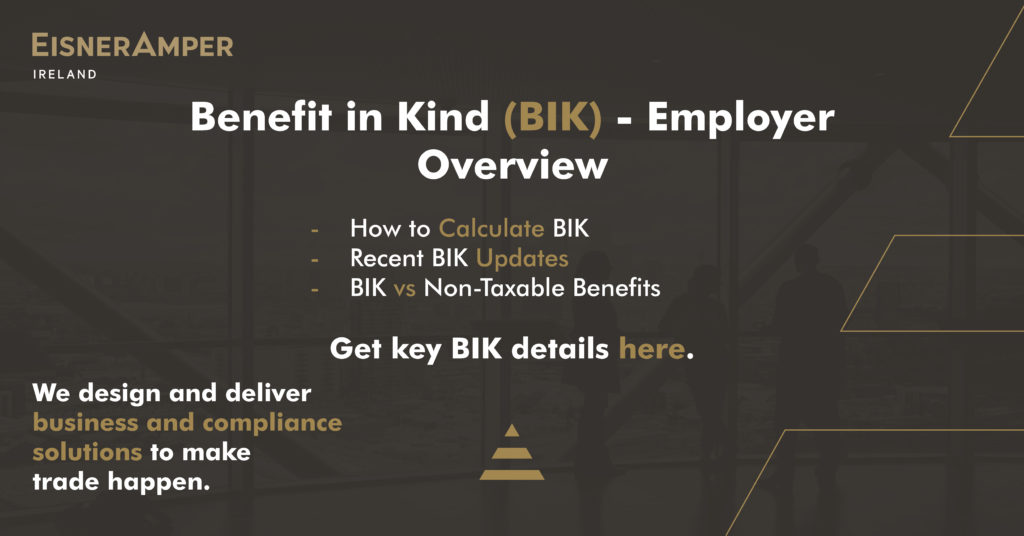

As a general rule, any benefit or perquisite, other than cash, which an employer provides for an employee would be considered a BIK once it has monetary value. It is the responsibility of the employer to calculate the value of the BIK and deduct the appropriate employment taxes via the PAYE system. Benefits given to an employee’s spouse or family members would also be considered BIK.
Tax must be deducted on the actual value of the benefits provided, unless the actual value is not known. In this case, tax must be deducted on the estimated value of the benefit.
The value of the benefit must be added to the employee’s pay as a notional pay element in the pay period in which the benefit was provided. PAYE, PRSI and USC are then deducted from the total value of the employee’s pay plus the BIK. This should then be reported to Revenue in a payroll submission either on or before the date the employee receives their net salary payment.
Some BIKs have specific rules which must be followed in order to calculate the taxable value.
The taxable value (known as the cash equivalent) is based on a percentage of the Original Market Value (OMV) of the car, less any discount received when the car was purchased*. The percentage is dependent upon the number of business kilometres driven by the employee each year, as shown in the following table:
| Kilometres Driven | (% of OMV) |
| 24,000 and below | 30% |
| 24,001 to 32,000 | 24% |
| 32,001 to 40,000 | 18% |
| 40,001 to 48,000 | 12% |
| 48,001 and over | 6% |
(Source: revenue.ie)
Journeys to and from an employee’s normal place of work are not considered business travel.
Employees who work, on average, at least 20 hours per week, whose business kilometres are between 8,000 and 20,000 km per year and who spend at least 70% of their time away from their normal place of work can avail of a 20% reduction on their cash equivalent value.
If you purchase health insurance on behalf of an employee this would be considered a taxable BIK. Although the amount paid by the employer to the insurer is the net cost of the policy, the value of the BIK for the employee is based on the gross cost. The employee gets tax relief by submitting a claim for a Medical Insurance Relief tax credit via their Revenue account at the end of the tax year.

Before PAYE modernisation, corrections to estimated BIK values could be made at any point in the tax year up to the filing of the annual P35 return. Since 1 January 2019, when the actual value of a benefit becomes known after BIK has been calculated on an estimated amount, the correction must be made in the next available pay period.
Although in general all benefits are taxable, there are some exceptions to this rule. The following non-exhaustive list showcases some of the items which can be provided tax-free, provided certain conditions are met:
The information above is for guidance purposes only. Tax advice should always be sought before providing benefits and reimbursements to employees without deducting employment taxes.
The taxation of employee benefits can be challenging, particularly for non-resident employers and new businesses, although with continuously evolving legislation all employers should review their practices regularly.
At EisnerAmper Ireland, our dedicated team of payroll professionals and tax advisors are on hand to offer accurate guidance and advice on the taxation of benefits, as well as providing support and payroll processing services to both new startups and established businesses.
Learn more about our Outsourced Payroll Services here.
Request a payroll quote or request a callback from our specialists now.
*Discounts of more than 10% must be approved by Revenue.
The content above is provided for general information purposes only and is not intended to provide, nor does it constitute, professional advice on any particular matter.
 +353 1 293 3400
+353 1 293 3400

 +1 212 949 8700
+1 212 949 8700
 +1 345 945 5889
+1 345 945 5889
 +65 6305 9900
+65 6305 9900